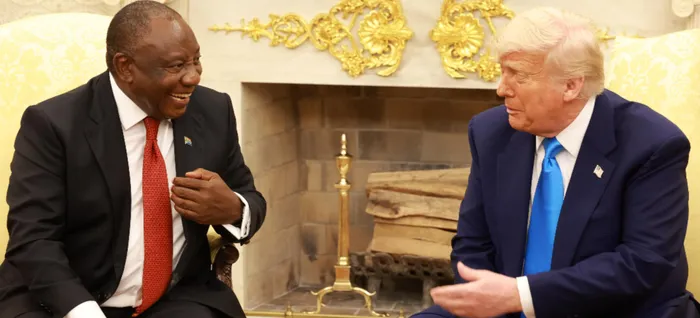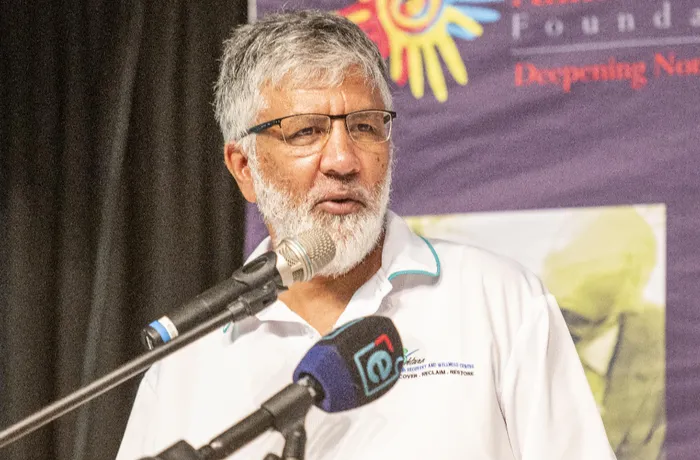Don’t let Trump trample on non-racialism in South Africa
"White racist nostalgia did not die out"

President Cyril Ramaphosa with President Donald Trump.
Image: GCIS
SEVENTY years ago, South Africans gathered in Kliptown to draw up an alternative vision to that of apartheid which became the official policy of the country under the National Party.
“We, the people of South Africa, declare for all our country and the world to know: that South Africa belongs to all who live in it, black and white, and that no government can justly claim authority unless it is based on the will of all the people; that our people have been robbed of their birth-right to land, liberty and peace by a form of government founded on injustice and inequality; that our country will never be prosperous or free until all our people live in brotherhood, enjoying equal rights and opportunities; that only a democratic state, based on the will of all the people, can secure to all their birth–right without distinction of colour, race, sex or belief; And therefore, we, the people of South Africa, black and white together – equals, countrymen and brothers – adopt this Freedom Charter. And we pledge ourselves to strive together, sparing neither strength nor courage, until the democratic changes here set out have been won.”
In the same year, the National Party started with its implementation of one of the key components of apartheid, the Group Areas Act. Thousands of people were forcefully removed from places such as Sophiatown.
Apartheid in education, sports, jobs and every aspect of life was to be entrenched rapidly. But 1955 also saw the establishment of organisations such as the Black Sash, an organisation of white women who opposed apartheid.
Fast forward to 1994. A government of national unity came into being after almost four years of negotiations. In 1996, a new Constitution was adopted.
The preamble to this Constitution follows on from the preamble of the Freedom Charter.
Recognise the injustices of our past.
Honour those who suffered for justice and freedom in our land.
Respect those who have worked to build and develop our country; and believe that South Africa belongs to all who live in it, united in our diversity.
We, therefore, through our freely elected representatives, adopt this Constitution as the supreme law of the Republic so as to:
- Heal the divisions of the past and establish a society based on democratic values, social justice and fundamental human rights.
- Lay the foundations for a democratic and open society in which government is based on the will of the people and every citizen is equally protected by law.
- Improve the quality of life of all citizens and free the potential of each person; and,
- Build a united and democratic South Africa able to take its rightful place as a sovereign state in the family of nations.
May God protect our people.
Nkosi Sikelel; iAfrika. Morena boloka setjhaba sa heso.
God seën Suid–Afrika.
God bless South Africa.
The new Constitution did not make provisions for the protection of groups rights and placed greater emphasis on individual human rights. The Bill of Rights section in the Constitution is one of the most admired across the world. Its provisions are what many who struggle for human rights across the world aspire to.
There has, however, been some in South Africa and in the Western world who never accepted the non–racial vision of the Freedom Charter and the 1996 Constitution. White racist nostalgia did not die out. It went quiet and also developed global connections with similar right-wing movements across the world.
They deeply regretted the abolition of apartheid.
The coming into power of Donald Trump has given new energy and confidence to the global right-wing. Some argue that in the USA, Trump and his Republican Party as well as the huge right-wing infrastructure are on a path to resegregate the country. They intend to reverse the gains of the Civil Rights Movement through what some call the Great Resegregation.
This is happening in three areas of life: in politics, education and employment, and popular culture.
The disguised racist language according to Mehdi Hasan is one where DEI (short for diversity equity and inclusion) is the new “N” word and is thrown around by high-profile conservatives, from the president of the US downwards, for the express purpose of undermining black people in public life.
What drives this fear is that to Trump, South Africa is a cautionary tale for the US.
In the 1990s, when one of his advisers mentioned a news item projecting that non-white people could become the majority in the US, Trump shot back that there would be a revolution should that happen.
“This isn’t going to become South Africa,” he said, according to a book about the president, Confidence Man, by Maggie Haberman, a New York Times reporter.
A number of factors have fuelled Trump’s hostile attitude to South Africa. They include his meeting with Afrikaner right-wing activists, his opposition (and Biden’s) to South Africa’s position on Palestine, and his vehement negative attitude to issues of transformation and empowerment for black people.
These views are reinforced by a group of advisers that include former South Africans such as Elon Musk. Days after his inauguration, Trump’s attacks on South Africa commenced. His latest statement a few days ago about there being a genocide against white Afrikaners continued that attack.
These repeated lies became the basis for the fast tracking of a group of 49 people who are supposedly refugees fleeing from genocide in South Africa. Their presence in the US was made possible after Trump suspended the US refugee settlement programme in January, leaving more than 100 000 people approved for refugee resettlement, stranded.
In February, he signed an executive order directing officials to grant refugee status to Afrikaners. The truth according to almost all analysts and academics is that the 49 people were in no way refugees. Their huge luggage cargo belie any sense of people fleeing persecution.
South Africa is far from perfect
Our democracy has not delivered on its promise of a better life for all. With all that is wrong in this country what has not happened here is the singling out of a minority group for violent persecution by the state.
Trump needs these so-called refugees to make a case of genocide to counter the case of real genocide that South Africa has championed at international platforms. He also needs it to bolster the fear among white Americans of what the US might become when whites are the minority population group there.
This is an essential part of his and the right-wing agenda to execute his Agenda 2025. This is a plan for long-term right-wing conservative rule there. Journalist Richard Poplack writes that: “Whether they know it or not, the people who boarded that chartered flight are props in a grand performance of white supremacy, conducted by the president of the United States and his henchfolk.”
Stephen Grotes echoes Poplack in writing that: They are likely to be paraded around as proof that ‘white people are victims’ and thus need special protection. As a result, South Africa will be a convenient target for his administration for as long as he is president.
Journalist Quanitah Hunter warns that it may seem absurd, but Trump’s Afrikaner Act has little to do with the people who will be relocating to the US, and more about creating a reality to justify what’s to come. This is not the end, it is just the beginning. It is the justification that will shield the US when it ultimately extends its wrath on South Africa.
It is a step closer to the sanctions or whatever madness Trump and his lieutenants have salivated over.
Academic Lisa Otto, Associate Professor and SARChI Chair: African Diplomacy and Foreign Policy at the University of Johannesburg, further warns that the danger is not just in validating these claims, but in what it says about South Africa’s sovereignty.
When a foreign power grants refugee status to a privileged minority from a democratic country without conflict, it undermines the legitimacy of South African democracy itself.
Afrikaner journalist Max du Preez wrote that just for the record: Afrikaners are generally better off today than prior to 1994, when they gave up political power; materially, culturally and in terms of personal freedom.
South Africa’s progressive Constitution with its extensive Bill of Rights is intact; the rule of law is maintained, and the judiciary is independent and functioning; we are a genuinely open society with free speech and media that many other democracies, especially Trump’s America, can be jealous of.
Following the meeting between Trump and Ramaphosa on Wednesday, I hope Ramaphosa will invite Trump and a multiparty delegation of political leaders to come and see first-hand the so-called genocide of Afrikaners in South Africa. This will put an end to their lies.
I doubt they will take up any such offer.
Ramaphosa’s remark at the recent agricultural show is one that we must rally around.
“And if you look at all national groups in our country, black and white, they’ve stayed in this country because it’s our country and we must not run away from our problems. We must stay here and solve our problems. When you run away you are a coward, and that’s a real cowardly act,” he said.
Ramaphosa and all political leaders must make it possible for all to contribute to the formulation and execution of such solutions. The proposed national dialogue might be the starting point for the identification of these solutions and the development of a plan for its implementation.

Neeshan Balton
Image: Supplied
Balton is the executive director of the Ahmed Kathrada Foundation.
** The views expressed do not necessarily reflect the views of IOL or Independent Media.
